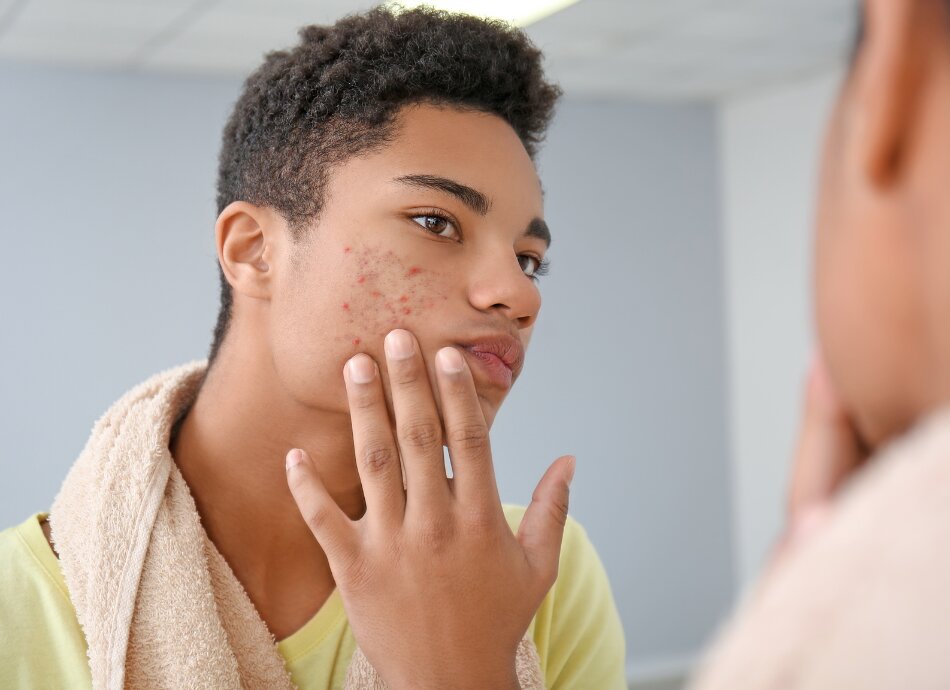Acne medicines
Ways to treat your acne
Key points about medicines for acne
- There are various treatments available depending on the severity of your acne.
- Mild acne can usually be treated with over-the-counter products you can buy from your pharmacy.
- If you have no success with over-the-counter products or your have moderate-to-severe acne then it is best to visit your doctor for medicines on prescription.
- Read about the different options and how they're used.

There are a variety of treatments for acne. Treatments try to stop new pimples forming by reducing or removing the oil, bacteria and other things (like dead skin cells) that clog your pores. They can also reduce the inflammation or irritation response of your skin to bacteria.
The choice of treatment depends on how severe your acne is.
- Mild acne is common and usually goes away with time, without scarring.
- However, inflamed acne can scar. If you develop inflammation, such as redness, red spots or pustules, it's best to treat this early to prevent scarring. It may take 4–8 weeks before you see any improvement and know whether the medicine is working.
Mild acne is usually treated with medicine that is applied to your skin. This is called a topical treatment. It includes creams, gels and lotions. Many of these treatments can be bought from your pharmacy without a prescription.
They work by cleaning your skin and drying up excess oil (sebum), killing the germs (bacteria) that cause acne or reducing the redness, soreness and inflammation associated with acne.
Talk to a pharmacist before you buy a product to find out which treatment is best for you.
Topical treatments are best applied to your whole face and not just where there are acne spots. Some treatments can irritate your skin, so it may be best to apply the cream, gel or lotion on a small area first a few times before applying it to a larger area.
You may also be advised to gradually increase the use of the treatment, eg, using it once or twice weekly and gradually building up to daily use.
These following products can be bought from your pharmacy without a prescription:
- Antiseptic washes with triclosan or benzoyl peroxide.
- Mild salicylic acid preparations to exfoliate and unplug your pores.
- Benzoyl peroxide (such as Benzac). Benzoyl peroxide is available in different brands and strengths and comes in a cream, gel or wash. The lower strength is enough for most people and causes less skin irritation. It's best to start treatment with the lower strength, especially if you have sensitive skin then, if you need it, increase the strength gradually. Read more about benzoyl peroxide.
- Azelaic acid (also called Skinoren cream or Azclear lotion) is less likely to cause irritation than benzoyl peroxide.
- Hydrogen peroxide cream (also called Crystacide or Crystaderm).
The following skin treatments need a prescription:
- Antibiotics, such as clindamycin solution (Topicil), should be used as short courses and are best used with benzoyl peroxide, azelaic acid or a retinoid to reduce the chance of antibiotic resistance.
- Retinoids such as adapalene (Differin gel) and tretinoin (Re Trieve cream). This is the most effective topical treatment type. Retinoids should be applied at night as they break down in sunlight.
Treatment for moderately severe acne usually includes tablets or capsules, which are usually prescribed for at least 3–6 months.
Antibiotics
Examples of antibiotics include doxycycline and erythromycin. They work by killing germs (bacteria) that contribute to the cause of acne. They also reduce inflammation. Antibiotics are ideally used in combination with a topical retinoid or benzoyl peroxide. Antibiotics can lead to antibiotic resistance and so, in most cases, they should not be used long term.
Hormone therapy
The combined oral contraceptive pill containing ethinylestradiol and an antiandrogenic progesterone (cyproterone or drospirenone) can improve acne in women by reducing sebum secretion (which is controlled by androgens). Hormone therapy examples include Ginet.
These may be helpful if you have breakouts around the time of your period, polycystic ovary syndrome or acne around your neck and lower face. At least 3–6 months is needed to work out whether it is effective for you.
There is an increased risk of blood clots in women taking cyproterone acetate with ethinylestradiol, particularly during the first year of use. Read more about the combined oral contraceptive pill and hormonal contraceptives and blood clots(external link).
Isotretinoin
Isotretinoin greatly reduces the amount of oil (sebum) made by your sebaceous glands. It works very well and usually clears spots even in severe cases. Isotretinoin is not suitable for women who are planning a pregnancy or if there is a chance you may become pregnant. It is harmful to your unborn baby, so contraception should be used if you could become pregnant and are taking isotretinoin. Read more about isotretinoin.
References
- Managing acne in primary care(external link) BPAC, NZ, 2013
- Acne and rosacea(external link) NZ Formulary
- Acne(external link) DermNet, NZ
Brochures

Medicines and side effects
Healthify He Puna Waiora, NZ, 2024

Health Quality and Safety Commission, NZ, 2019 English, te reo Māori
Credits: Healthify editorial team. Healthify is brought to you by Health Navigator Charitable Trust.
Reviewed by: Angela Lambie, Pharmacist, Auckland
Last reviewed:
Page last updated:





